Thursday, 06 March 2025
To find a self-respecting restaurant or supermarket snack bar not equipped with a restaurant-size Italian espresso machine can be difficult, and even the tiniest organic corner shop will try to offer you ubiquituous Italian-style coffee drinks. Likewise you can have organic tea bag teas and infusions of usually decent quality. But for the modern nomad on the job, the afternoon chat with friends or the traveller in search of a undisturbed place for a break or observations, the dedicated coffee or tea house is a far more appropriate place to spent hours.
Common for all the places listed here that they are closed in the evening – usually around 6pm, some keep open until 8pm. Note that weekend opening hours may be even more restricted.
Viennese-style coffee houses
The headline is misleading – even if an increasing number of cafes see themselves in the tradition of Viennese coffee houses when it comes to the stuccoed interior, the dark wooden furniture, a selection of daily newspapers as well as the menu, they will usually serve Italian-style coffee drinks. The perfect place for breakfast and a coffee break at any time of the day, you will also be served lunch and snacks throughout the day. Expect however to order more of the deliciously handcrafted cakes than you initially intended to.
To my knowledge the only one left since the end of 2020 and my absolute favourite is the restored Cafe Reichshof in Haidhausen, covered in detail in my ice-cream post.
Oriental-style coffee
Since Iunu stopped serving Turkish mocca the only place offering responsibly sourced oriental-style coffee in Haidhausen is Saladins Souk with its rather irrational opening hours. If it is closed you may move next door to Erbils vegan Turkish eatery.
In autumn 2021 I noticed to my delight that these aren't the only mocca places anymore: The Icedate ice-cream parlour in Maxvorstadt started serving organic coffee, although the price tag of 2.40 EUR the mocca is rather stiff.
Italian style bars
Pop in, have a coffee, a chat, a sweet, and pop out again – the Italian bar is the hotspot of a neighbourhood. To my deepest regret its Bavarian incarnation is no more (landlord cancelled contract with the coffee roastery), but
in the middle of humming Viktualienmarkt market North of the crossing Reichenbachstraße/Frauenstraße there's Kaffeerösterei Viktualienmarkt, a vibrant market booth with bar tables under a roof. So even if the weather is bad and you're outside there's no reason to give up plans for an Italian style coffee drink made with sustainably sourced (though not organically certified), locally roasted coffee. The milk is organic and comes from traditionally working mountain farms in the Berchtesgadener Land district, packaged by the co-operatively driven Berchtesgadener Land dairy which, in 2017, banned the use of glyphosate for all its farmers, not only the organic ones.
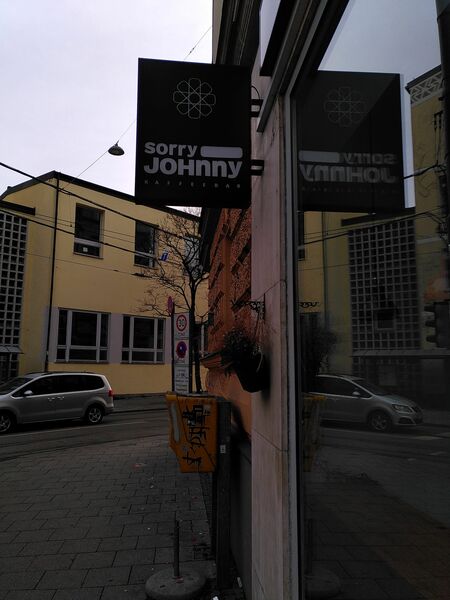
If you prefer your coffee with biodynamic (Demeter) milk head for the Sorry Johnny coffee bar in Haidhausen, conveniently located at the Wörthstraße tram stop. The place has quite unusual opening hours: closed on Tuesdays and Wednesdays, and open during the early evening
on Fridays and Saturdays. The bar replaced a vegan clean-eating spot in autumn 2021 which, for a while, prepared my favourite oat-based latte – a coffee preparation that's still available here.
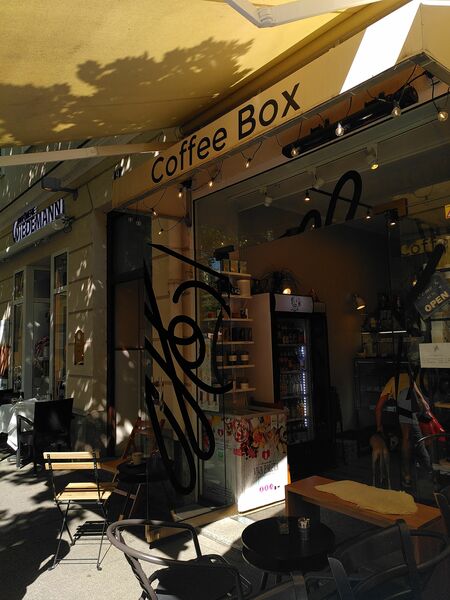
Without the heavy car traffic the area between Max-Weber-
and Wiener Platz could be a lovely urban hideaway, with singing tram tracks, an underground station (exhibiting Munich's first horse tram), pleasant shops, cafes and nearby parks. To escape from the agressive passive motorised mobility along Innere Wiener Straße jump into quiet Steinstraße and take a breath at the tiny
Coffee Box cafe. Although some of their coffee is roasted by
Merchant & Friends in Glonn, none of the
beans served here are organic. The milk, however, is organic, as is the ginger and pomegranate juices used in some drinks. For a refreshment in the summer heat have an
organic, vegan popsicle.
If you want to mingle with people from the neighbourhood in Haidhausen head for the Italian-style
Fortuna Cafébar for a snack or a short coffee break. The milk is organic (though not the oat drink), and if you are in the mood for a "würstel" snack, the Frankfurters are organic, too. More organic ingredients may be hidden in the Italian-style sandwiches. Since the crossroad got bicycle parking on all four corners it's also become a relaxed place to watch people.
Not certified organic, but responsibly sourced coffee beans grown with respect for nature by small scale farmers – the coffee roasted at
the Alrighty coffee bar in
the newly developed, trending Werksviertel will nevertheless give you the comforting feel of doing something right. To find the place leave Ostbahnhof station through the Friedensstaße exit to enjoy a speciality coffee preferably in the sun.
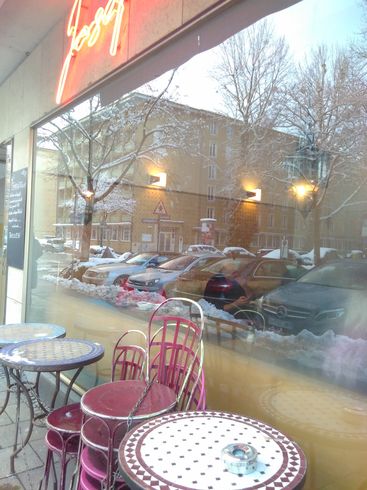
(Almost) fully organic
If all you want is a place where you do not have to fine-read the menu to pick out the organic items your options are limited to the afore mentioned Café Reichshof, near tram stop "Wörthstraße") – and to Café Josefina in the legendary neighbourhood of Schwabing with its bohemian past, a few steps from tube stop Josephsplatz.
A cosy day cafe serving Italian-style coffee drinks made with real milk or a number of plant-based alternatives it's not only worth a coffee but also a lunch break. Although nearly all ingredients are organic there are a few exceptions when it comes to the cold cuts used in Italian-style sandwiches. As early as half past seven the place starts serving both, vegan, vegetarian, and omnivore breakfast on weekdays, and since it is quite small it's advisable to reserve a table if you plan to step by on a weekend.
For a fully organic breakfast or coffee near Münchner Freiheit head for the small artisanal (and fully organic) Brotraum bakery happily catering for early birds. The breakfast menu is simple – but you can order additional items like eggs and cream cheese on top or ask for a freshly prepared sandwich or roll of your choice. Don't forget to bring your own bags and containers when you come here to buy bread, rolls or lunch items for take away – the owner is inclined to support your zero waste efforts.
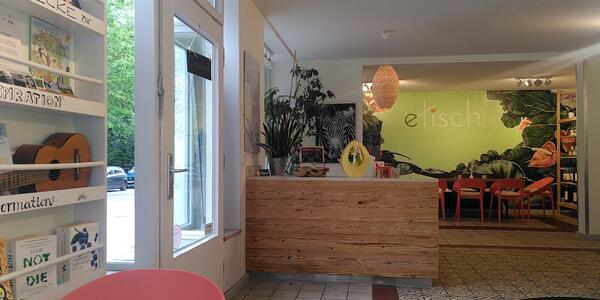
Shabby chic and homely places
The Westend has lost a lot of organic or partially organic places after or during the covid 19 pandemic, so I am happy to see a location with a long history of being organic to be revived in this spirit: The new (in 2024) vegan cafe
Etisch
at Gollierplatz
opened in lieu of one of those friendly, crammed owner-run organic cornershops, Nico's.
Its chef (as of April 2024) was in the process of getting a organic certificate for his kitchen, and the owner, Aylin, was planning to obtain a certificate, too.
For the time being, many ingredients are already organic, but not all. The pear-chocolate cake I had was soft and far too fast eaten. In addition I had a very decent cappuccino with organic oat milk (the default however is a conventional brand with aggressive marketing). Had I been hungry I'd have given the Turkish-style börek a try. Etisch – the name is a pun of the German words for "ethical" and "table" ("Tisch") – also offers a tempting lunch menu.
In addition you can shop for body care, olive oil, the non-alcoholic gin substitute of the otherwise organic distillery "Duke" in Aschheim and other sustainable (though not necessarily organically certified) products.
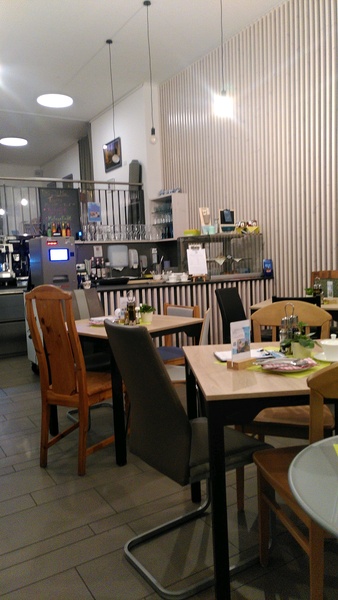
The neighbourhood cafe
JoMa (short for "John and Mary") at Carl-Amery-Platz in the Au is one of the few places where you can get predominantly organic lunch, snacks and drinks at a price also affordable for smaller budgets once in a while. The place is run by a registered social association founded by the local Lutherian and Catholic parishes and receives grants from the city of Munich. You will meet both, payed employees and volunteers, including people with a handicap. Lunch is served as a daily changing buffet made from predominantly local and/or organic produce from 11 am to 3 pm. The cake is home-made, and the coffee made with a proper steam machine. Unfortunately the place is closed during the weekend.
On Tuesday evenings (when the cafe itself is closed), there are
Pilates classes
for which you have to
sign up in advance and bring your own mat. The place hosts other events with a social and/or spiritual focus, too.
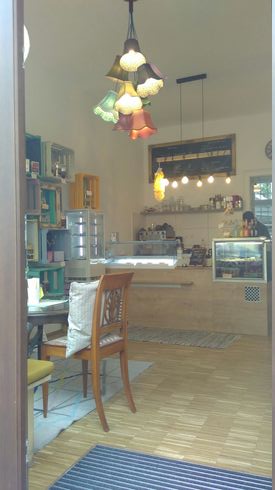
A small cafe of old, run as a social enterprise just a five minutes walk away from Rosenheimer Platz, Cafe Plaisir moved to a bigger and lighter venue in 2018 – and stopped using organic ingredients for their home-made ice-cream, chocolates, cakes and cookies. Still, tea and coffee drinks and a few more items are marked on the menu with a little heart denoting organic, and eggs – where marked – come from organic farms raising both, the hens and their cockerel brothers. Be patient and kind if the serving personnel does not respond immediately – the shop is a social enterprise run by longterm-unemployed persons.
Not far from Ostbahnhof station Kosy*s cafe promises to be "your second living room". As long as you have some tolerance towards cake stands filled with kitschy sweets guaranteed free from natural colourings and a decidedly vintage feel you can have an organic tea or soft drink, a coffee drink made with organic milk, organic eggs and cereals for breakfast or a hearty lunch often entirely made from organic ingredients in a leisurely atmosphere. The good thing is that organic ingredients aren't shamefully hidden – when it's organic they'll make it transparent on the menu. The bad news: their homemade cakes unfortunately are not organic, not even the eggs.
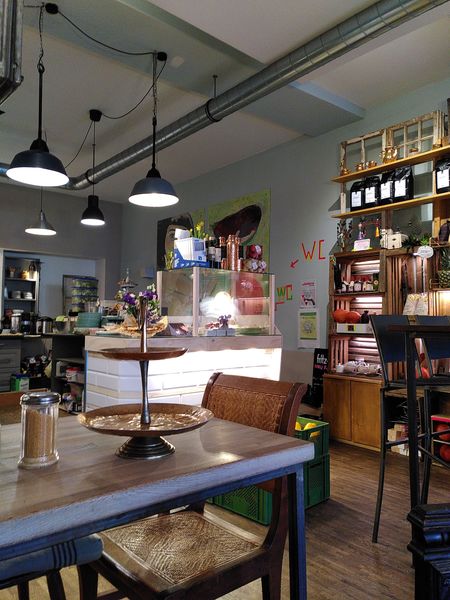
A few steps away, directly located at Orleansplatz cafe Iunu is a perfect place to meet a friend for a chat or to have a recreational coffee break including a chat with the friendly owner. Some of the coffee, the milk, the tea and a few staples used in the daily changing vegetarian and ayurvedic-inspired lunch set menu like agave syrup, rice and vegetable yogurt alternatives are organic, but unfortunately usually not the veges. The place was my joker for the best Turkish mocca in town, but unfortunately it is no longer being served due to marginal demand. With a small but carefully chosen (though not necessarily organic) range of delicatessen Iunu will also save you when in need for an unplanned last minute gift. On Saturdays the cafe is often unexpectedly closed due to arrangements, so check in advance.
Another cosy living room dubbed Zimtzicke is tucked away in comparatively quiet Elsässer Straße, only a five minutes walk from Ostbahnhof. All their teas, coffees, the milk and eggs are organic. Their lunch dishes, although mainly not organic, are tasty. However, when I enquired about the ingredients of the individual dishes on the menu, the staff wasn't able to tell whether they contained organic ingredients. The tiny place smells lovely of home-make cakes, some of them vegan. A perfect location to warm up after a winter walk in the city, and a pleasant retreat to welcome spring or to enjoy a summer day in the city on a table in front of it.
Most cafes in this area in the neighbourhood of Haidhausen, among locals also known as the Franzosenviertel ("French quarter") for its French street names, draw on European kitchen and coffee traditions. The
Café Miu at Pariser Platz is a notable exception when it comes to food: The signature dish are Banh Mi, healthy Vietnamese sandwiches made from baguettes for all, including vegans and meat lovers. The place is clearly an all-day breakfast iand coffee place, serving
organic eggs and international breakfast varieties until 3 pm. The Italian-style coffee drinks come with organic milk, and the soft drinks are also organic. Until the local Emilo coffee roasters had to give up (a real estate developer rendered their roasting equipment unusable) the place also served this coffee. The cafe is driven by the family behind the Fei scho eatery: They exchanged the location of their Haidhausen-based branch with the place which became Café Miu.
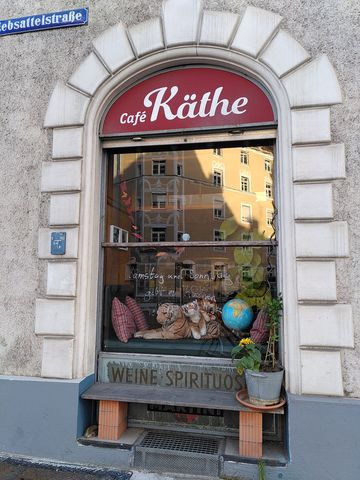
Another option to mingle with natives is a homely shabby chic neighbourhood cafe cum gallery in the neighbourhood of Au, on the Eastern shore of river Isar near Deutsches Theater. The audience of Café Käthe is mixed, coffee, milk, tea, rolls and cakes as well as most of the softdrinks are organic. They don't serve hot food, but you can have breakfast, sandwiches, cereals, salads and - of course – cake all day. Many but not all ingredients are organic, so ask if you care but be prepared that the service personnel isn't prepared to answer on the spot.
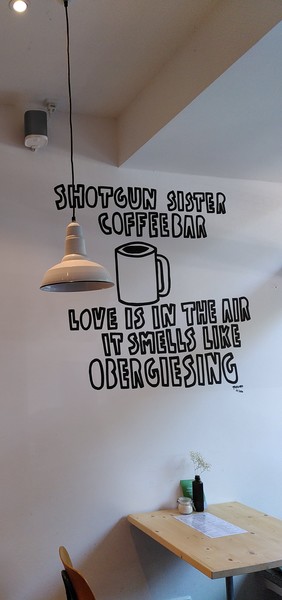
A crowded neighbourhood coffee bar in Obergiesing, Shotgun Sister allows you to meet people from the former working class borough which has been popular among both, students and families alike. All food including the cakes are home-made, with organic fruit and veges, often from local biodynamic agriculture. The cakes are fully organic. If you cannot spot the place at once watch out for the branch of the organic Hofpfisterei bakery chain which is located next to it, a five minutes walk from Giesing station. If you like splash out a coffee on an unknown – as the sister participates in the Hey campaign for fellow citizens in need. Needless to say that vegan and gluten-free options are readily available.
Big enough to almost guarantee a free seat for the visitor-by-chance is Cafe Katzentempel in the Maxvorstadt university quarter. You must however not suffer from a cat allergy as this rather special vegan place is inhabitated by six cats, and the once nice wallpaper on the wall with the scratch pole facing the entrance has already become rather shabby. Most of the softdrinks are organic as are all soy products and the cow milk (on request used for non-vegan coffee and tea-based drinks). The place offers an impressive range of organic nuts and grain milks to be ordered for your latte. The food and home-made cakes may include additional organic ingredients, although they aren't generally organic, just of local origin if possible. Students and apprentices are entitled special prices Tuesday through Friday, and free wifi is available. Depending on your table you may find the slightly aggressive sales presentation of the Katzentempel brand t-shirts disturbing – overall a place to either love or detest.
Further along Türkenstraße you'll find Mr. Ben – a small coffee cum snacks place offering (herbal) tea and soft drinks in organic quality. Unfortunately neither the coffee artisanally roasted in the neighbourhood of Giesing nor the milk and oat milk are organic.
There's a small selection of Italian-style piadina sandwiches and freshly home-made cake which occasionally may contain organic ingredients. The croissants used to come from an organic bakery a longer bicycle ride out of town but they were sold out (just like the veggie piadina) when I was there. Orders should be placed at the bar, but you will be served, and return to the bar for payment, preferably (and if the sum is smaller than ten euros only) in cash.
If you prefer strictly vegan places for a coffee break try Siggis which I reviewed here.
Self-service coffee house and deli bars
For the no-frills coffee with WLAN or on the go a number of nation-wide operating self-service coffee house chains serve Italian and American-style organic coffee often with organic milk and some more organic items like tea, soft drinks or fruit and nut bars. The market in Munich is quite volatile: The once dominating franchise San Francisco Coffee Company filed for bankruptcy during the covid-19 pandemics and does no longer have stores in Munich. Black Bean never expanded and survived, and Coffee Fellows is now ubiquitous, serving coffee at (among others) fuel and train stations.
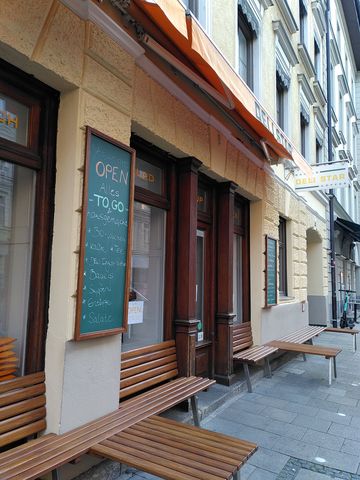
My favourite in this category is a small organically certified Munich-based chain: Deli Star brings the spirit of New York-style deli and coffee bars to town, but with a strong focus on the environment: No plastics here, all take away stews and salads come in returnable glass jars, and the coffee on the go in a Recup deposit cup if you don't bring your own. Not every ingredient in their bagels, sandwiches, stews and salads is organic, but all regular organic items are clearly marked BIO on the menu: the cakes (though not the muffins and brownies), most meat products, yogurt, Lemonaid and Adelholzener fruit and soft drinks. Other ingredients like veges and cheese may or may not be organic. The coffee isn't organic, but the milk comes in huge reusable containers from a local organic farm. In general they use a lot of products grown and produced in the region and/or from small-scale manufacturers. Both branches are located in students' hotspots in Maxvorstadt: near the University and at the entrance to the Englischer Garten park.
Mingle with the working crowd
Campus canteens and coffee bars frequented by those working nearby are excellent places to get in contact with locals – with the disadvantage of opening hours following office hours.
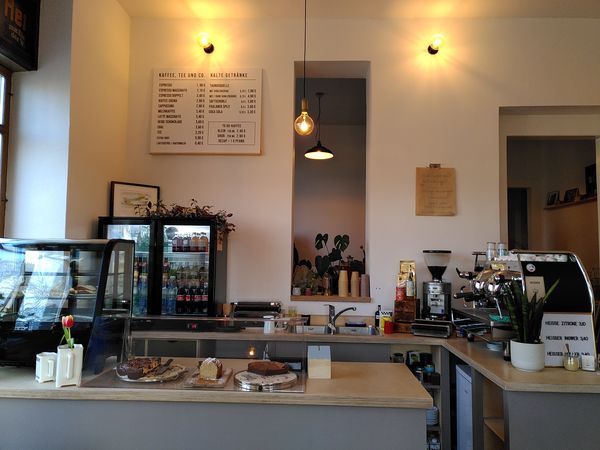
On the eastern side of the railway tracks of Ostbahnhof train station, a few minutes north of the newly developed Werksviertel you'll find day cafe Louka, a friendly no-frills place mainly catering for the office workers and craftspersons working nearby. What you get here:
coffee, home-made cakes and sandwiches, a
daily changing soup and main course, often vegetarian.
If you want to taste simple German everyday standards like Kässpätzle and Schupfnudeln, or the Russischer Zupfkuchen ("Russian pluck cake") cheesecake, this is the place. Not everything is organic here, but both, the coffee, the milk and the plant-based drinks, the eggs, often the veges and the meat are.
Steinhausen is most certainly not a neighbourhood you will have on your travel agenda, but if you come to the Berg am Laim urban train, bus and tram stop the coffee bar on the ground floor of the Süddeutsche Zeitung publishing house is nearby and open to the public. It offers organic organic soft drinks and sweet pastries at very competitive prices. The rolls used for sandwiches are also organic, but the new (as of June 2024) caterer "Kochmanufaktur" stopped using organic milk for coffee drinks. At times the oat drink is organic, and you can usually spot the package or ask. Insist on having a recup returnable coffee mug if you want to take out the coffee.
To mingle with journalists, developers, printers and all those involved in the production of Germany’s most respected daily newspaper this is the place despite the surroundings.
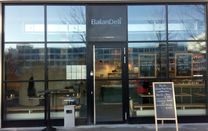
If you happen to strand in the urban desert of office blocks between the tube stops of Karl-Preis-Platz and Sankt-Martin-Straße head for the Neue Balan campus, a former industrial area where in the past Siemens produced semiconductors. Quite centrally you'll find Balan Deli, a modern yet comfortably furnished day cafe run as a not-for-profit company providing fair employment for an inclusive team of people with and without handicaps. The cafe was founded by the nearby inclusive Montessori school and designed by a Hamburg based artist. You can have a healthy lunch, partially based on organic ingredients, or simply an organic coffee, tea, wine or soft drink, often sourced from local producers, in a pleasant environment. The bread for the sandwiches comes from a local organic bakery. Unfortunately the service staff is not very knowledgeable (yet) about organic and sustainably produced food (when I enquired about the milk they told me it was organic although they actually use the cheaper conventional product of the Berchtesgadener Land dairy which also offers an extended range of organic dairy products), but was happy to ask the kitchen staff about the origin of the chicken in the Thai curry (which was not organic).
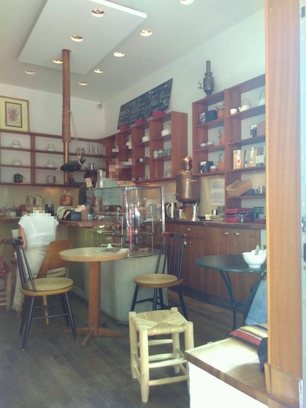
Tea houses
For those seriously into tea the ultimate target in town is Tushita Teehaus in the Glockenbach neighbourhood, near the Western exit of tube station Fraunhofer Straße (and a five minutes walk South of Gärtnerplatz). To taste their around 150 organic and often fairly traded tea and tisane varieties (which aren't exhaustively listed on the menu) can take some time, but you can buy them to take with you. With every order the staff will hold a microscopic tea ceremony for you, and hot water for a second extraction is served in a small thermos aside. In the past they often used too hot water for some of their delicate green teas resulting in a bitter beverage, but this fortunately had changed to the better at my last visit. In addition they serve small vegan dishes as well as yummy home-made cakes, all organic, and there's a Japanese touch to both, the decoration, the food and the subtle focus on Japanese tea and matcha. Consequently the place is frequented by visitors of Japanese origin as well as the occasional Indian gentleman or the German hippie or university professor reading their daily. Given how frequented the place often is there's a quiet, pleasantly concentrated atmosphere to it.
More to try
In the Westend, a few steps from Theresienwiese
Café Gollier is a pleasant neighbourhood day cafe, popular for breakfast and hearty lunch. They promise to use regional, preferably organic products according to availability, but so far I have not had the chance to eat here.
Closed
The following places ceased to exist, although you still may find references to them on the web:
- Contains Coffee, Celibidacheforum
- Echt jetzt, Barer Str. 48 (web shop remaining)
- Emilo im Glockenbach, Buttermelcherstr. 5
- Emilo Westend, Gollierstr. 14
- Emilo am Odeonsplatz, Odeonspl. 14
- Emmi's Kitchen, Rosenheimer Str. 67 (vegetarian cafe cum eatery)
- Epique Raw, Max-Weber-Pl. 11 (vegan patisserie shop-in-shop)
-
Fritz Brotbar, Nymphenburger Str. 154 (bakery cum cafe)
-
Fritz Mühlenbäckerei, Müllerstr. 46 (cafe cum eatery, re-opened in 2020 as bread bar w/ show bakery)
- Himmelherrgott, Waldfriedhofstr. 105 (cafe)
- gROOSartig, Donnersbergerstr. 8
- Die Kaffee-Küche, Weißenburger Str. 6 (cafe)
- Kafehaus Karameel, Nymphenburger Str. 191 (Viennese-style coffee house)
- Kuko, Westendstr. 87 (unknown whether the successor, Fika, is organic)
- Lolas Eckcafé, Metzstr. 37
- Kaffee Sonnenschein, Gietlstr. 17
- MyMuesli München, Viktualienmarkt 7 (cereals shop cum cafe)
- MyMuesli München-Pasing w/in Pasing Arcaden, Josef-Felder-Str. 53 (muesli shop)
- MyMuesli München OEZ w/in Olympia-Einkaufszenrum, Hanauer Str. 68 (muesli shop)
-
San Francisco Coffee Company, Nymphenburger Str. 151 (cafe)
- San Francisco Coffee Company, Innere Wiener Str. 57
- San Francisco Coffee Company Ostbahnhof, Orleanspl. 5a
- San Francisco Coffee Company Riem-Arcaden, Willy-Brandt-Pl. (cafe)
- San Francisco Coffee Company Maxvorstadt, Türkenstr. 47 (cafe)
- San Francisco Coffee Company Odeonsplatz, Theatinerstr. 23 (cafe)
- Black Bean, Amalienstr. 44 (cafe)
2025-03-06 11:30:00
[Munich, Au, Haidhausen, Maxvorstadt, Schwabing, Westend, Englischer_Garten, organic, coffee, tea, breakfast, lunch, snacks, fair, vegan, gluten_free, cafe, ice-cream, restaurant, American, Italian, Japanese]
[direct link · table of contents]

Wednesday, 22 January 2025
Organic supermarkets can be found on almost every second street corner in Munich but density varies from neighbourhood to neighbourhood.
Organic supermarket chains
In addition to a local organic supermarket chain, Vollcorner (consisting of about twenty markets in Munich and around), Munich hosts several branches of Germany's biggest organic chains Alnatura and Denns (both with more than 10 markets each within the city boundaries). The decline of the Basic chain (see below) which formerly dominated the city centre lead to the opening of a new centrally located Denns supermarket on the premises of a former Lidl branch in May, 2024 (the first Denns supermarket in the city centre did not survive tucked away in the basement of a mall).
Until mid of 2023 Munich was the home of the Basic supermarket chain with 11 markets – early in 2021 this chain restricted its activities to South Germany and Austria and sold all other nation-wide branches. However, these measures
did not stop the decline of the company due to management failures,
resulting in an insolvency. The Munich shops were taken over by the conventional
supermarket chain
teGut. Under the
new management
only the original Basic shop near Isartor and a second one near Nordbad are surviving as organic supermarkets, at least until the end of 2024. After this
grace period the company plans to evaluate whether 100 percent organic supermarkets will be part of their concept.
TeGut was not the first conventional full retailer experimenting with fully organic supermarkets: With the Naturkind supermarket in Harlaching the Edeka co-operative is also running an experimental organic supermarkt in Munich, their first and only in town.
With Basic on the verge, there are two regional full retail chains left in town:
Landmann's with branches in several Bavarian
towns, but only one within the Munich city boundaries, and Vollcorner
which does not have branches outside the Munich S-Bahn network. In addition
you'll still find
many small independent supermarkets, often using a Biomarkt sign, and even some homely, surviving corner shops.
Vollcorner has been making notable efforts to support zero-waste shopping for a long time, and burried many of them due to low customer acceptance. Shopping here you can however be sure not to (indirectly) support huge, globally operating multinational concerns as Vollcorner consistently delists organic brands sold to such companies. So you will find neither Logocos brands (Logona, Lenz, Sante, Heliotrop, Fitne) anymore since the company was bought by L'Oreal (which is partially owned by Nestle), nor Pukka tea (Unilever). Wine-lovers may also collect the corks made from natural cork and return them for recycling at any Vollcorner shop.
On weekdays most organic supermarkets keep open between 9 am and 8 pm, Vollcorner markets open at 8 am. Saturday opening hours vary, the big retailers and Vollcorner close at 8 pm. All groceries except
the Biokultur supermarket in the basement of the central train station are closed on Sundays.
Apart from these full range retailers there is a small local food only chain, not offering any toiletries or detergents: Herrmannsdorfer specialises in meat products, bakery items and beer produced in the Herrmannsdorfer Landwerkstätten in Glonn, somewhat outside Munich. The shops close quite early, but if you come during daytime they stock sufficient dry food, dairy products, fruits, veges, sweets and more to spare you the trip to a second shop. Unlike the Basic chain Herrmannsdorfer allows you to buy meat in your own containers.
In 2015 a branch of the hyped Italian Eataly delicatessen chain opened within the architectonically interesting glass and iron construction of Schrannenhalle near Viktualienmarkt. It's true, they offer a good range of organic products, and organic food items are labelled as such on the shelves, but it's nevertheless a disappointing experience: Almost no fresh organic fruit and veges (not even the fresh herbs are organic), only pre-packaged organic meat (forget about the well-assorted meat counter), and the organic wines and spirits in the basement are not marked "bio" on the shelves, so it's very hard to find them.
Independent full-retailers
If you want to support the local economy, both Vollcorner and Herrmannsdorfer shops are all fine, but you may prefer to support independent markets where the owners are actually running the stores and create a homely and personal atmosphere. Often you will find products not on sale by the big chains.
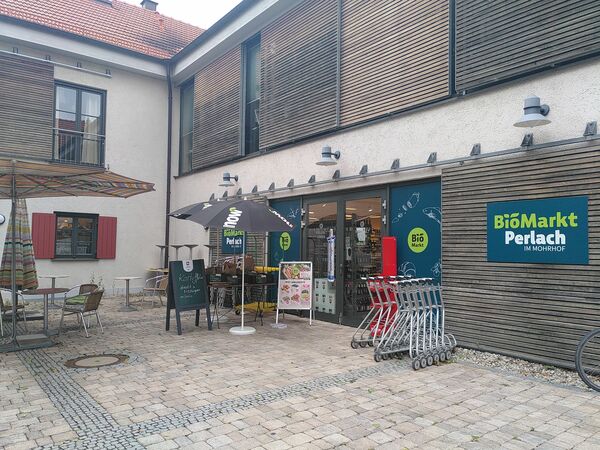
When traditional Grüner Markt chain closed down end of September 2014, their main house in the Altperlach neighbourhood made an exception. Housed in a vault it has a pleasant italophilic, somewhat venerable atmosphere, definitely worth a visit. The perfect surroundings when shopping for delicatessen, and a must-go during the Christmas season. It's now dubbed Mohrhof Perlach.
The other big independent is Schmatz ("smack") in the Glockenbach neighbourhood. Step by if only for the lovely decoration of their bodycare section. Kids are invited to play in an old-fashioned corner shop, and selected items are lovingly set on display. It's the only organic supermarket playing music in the background. By the end of 2018 they issued a ban on fresh herbs in plastics packing, and in 2022 there's a dedicated unpackaged shelf with dry food in deposit glasses.
For the picturesque yet upmarket farmshop feeling in the city aim for Stemmerhof on top of the Sendlinger Berg. Once upon a time a wealthy village farm opposite the village church the nicely restored houses are now the home of an organic supermarket and a range of small owner-run shops. The supermarket's butcher's cum delicatessen disk will happily sell lunch snacks to eat on the spot or to take-away. The same enterprise also runs a second branch in the suburb of Grünwald, just a street crossing opposite of Alter Wirt hotel and restaurant.
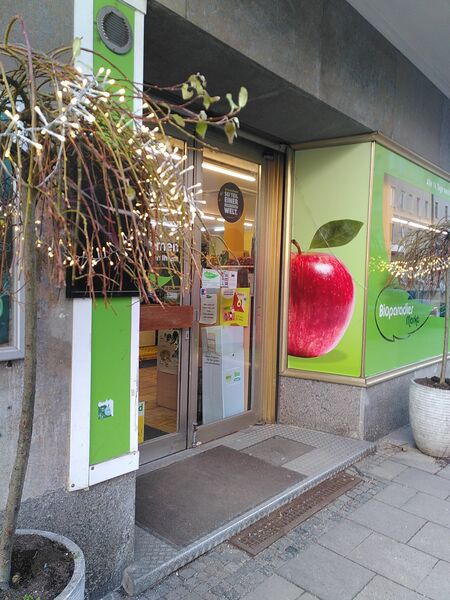
In the posh Lehel neighbourhood near the Eisbach river within the Englischer Garten park you'll find an independent organic supermarket with a touch of a spice and greens bazaar, the Bioparadies Biomarkt. Its friendly staff was even willing to open after closing time, to sell me a left-over bread on a Saturday afternoon. The serviced bakery and cheese counter is also the place to refill your spice jars with loose-weight herbs and spices. The supermarket is conveniently located opposite the tram stop "Paradiesstraße".
The former Erdgarten supermarket a ten-minutes walk away from Pasing train station (or two minutes from Pasing Marienplatz square) reopened as a branch of the local Vollcorner chain September, 2019 and continues to serve organic and vegetarian wholefood lunch as well as coffee and cake. They also have a nicely decorated bodycare section. Whether they'll continue to serve knitters with a fine selection of organic wool I am not aware of.
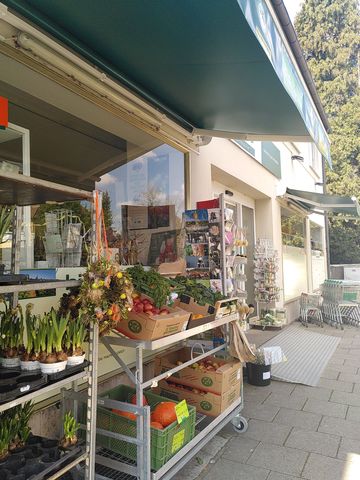
If you by chance happen to strand near the Klinikum Harlaching hospital, don't dispair: two tramstops in North-Eastern direction on the left side (just follow the tram line along Grünwalder Str.) you'll find Biowelt, a crammed independent organic supermarket with a superb selection of both, bodycare and frozen convenience products: All you need if visiting a friend or relative in the hospital in urgent need of a proper meal. Starting with lunch time they offer a helping of organic soup and a small selection of snacks. You may ask for a sandwich made on the spot. The shop also has a zero waste corner with dispensers for legumes and a small selection of other dry food as well as an assortment of dried fruit. Make sure to step by check-out to weigh your containers before you fill them.
Attending a conference at one of the huge Bogenhausen hotels near Effnerplatz? Your lunch break should be sufficient to follow Bülowstraße in Western direction to Herkomerplatz. Here you'll find not only a Herrmannsdorfer butcher's shop cum grocery cum eatery and the Hofpfisterei bakery branch next to it, but also a pleasant family-owned organic supermarket dubbed Biovolet. The Riemensberger family placed some bar tables in the entrance area to have a snack, and there is a second branch in Eching (formerly a Grüner Markt branch). Pay with your EC (VPay) debit card, and they donate a few cent to the BioBoden co-operative which buys farm land in order to lease it to organic farmers. On Thursdays you will receive a 10 percent discount if your shopping cart is worth more than 50 euros.
In the neighbourhood of Schwabing one of the oldest organic groceries in town is located, these days rather boringly dubbed Echt Bio Markt which is the brand of a network of small-scale independent organic supermarkets. The pleasant, traditional shop in Tengstraße offers refill for organic household detergents.
However. not all supermarkets of this brand have been long established: The independent owner-run Echt Bio Markt in Nymphenburg was opened during the lock-down of the covid-19 pandemic: As its name suggests
Bio am Romanplatz is the perfect place
to shop for provisions at the tram hub at Romanplatz.
There's only one Sunday-open organic supermarket in Munich, the Biokultur in the basement of the main train station. It's sister branch in the newly developed neighbourhood of Riem on the plot of the former Munich airport can be found inside the
Riem Arcaden shopping mall, sporting the only organic cafe in the neighbourhood. Unfortunately neither the cafe nor the supermarket are open on Sundays or public holidays.
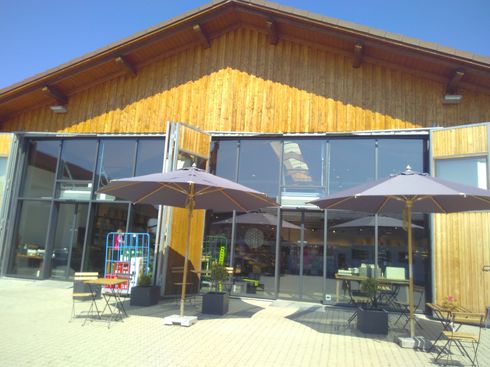
If you happen to take the S7 urban train in southern direction to the municipality of Höhenkirchen-Siegertsbrunn take the time to visit Roberts Bio-Genussmarkt on the premises of a former farmyard. The spacious, pleasantly refurbished and nicely decorated barn with its dark wooden shelfs makes it easy to spend some time on a coffee and cake in the included cafe area. When the weather is nice sun-shaded outdoor seating is provided. The former village of Höhenkirchen is part of the Mangfall bicycle route from Munich to Rosenheim, and this is a pleasant place for a break.
Waste-free supermarkets
By 2016 the first wrapping free supermarket made it into town: Check the zero-waste post for reviews.
Co-operatives with membership schemes
In the 1970ies and 1980ies many organic neighbourhood shops in Western Germany were co-operatively organised and sold to members only. In the 1990ies most of the surviving shops like the "Abakus" in Bremen opened to the general public, with discount schemes for members. To my knowledge, there's no such surviving shop in Munich, but recently established co-operatives such as "Deine Alternative" in Zorneding continue this inclusive approach.
As community supported agriculture (CSA) has an increasing appeal to city dwellers (the biggest one in Munich is the Kartoffelkombinat), the concept of an organic supermarket for members only came back to town in 2016, with
the Ökoesel ("eco donkey"), by now a small, yet full-fledged organic supermarket
in Nymphenburg near Leonrodplatz, focussing on
package-free food.
When the founders of Munich's oldest organic
supermarket, Lebascha in Haidhausen,
were to pass over the shop to a younger generation in summer 2022, the Ökoesel folks stepped in. Although both branches focus on a membership scheme, they are neighbourhood groceries open to everyone. As a non-member you'll simply pay non-subsidised (i.e. higher) prices.
In
summer 2021, another approach followed with the establishment of the Foodhub co-operative in Giesing, next to the lovely cafe "Shotgun Sister" and an organic bakery shop.
If you live in the vicinity you may consider joining this special organic food co-op which runs on the principle of solidarity: every member works three hours per month for or in the project and what's sold in the supermarket (predominantly regional produce) is decided democratically by its members. The shop concentrates on pre-packaged food, household and toiletry items, with the exception of loose weight fruits and veges, a small number of dry food gravity bins offering grains and nuts, and the self-service bread and rolls section. The household cleaning and bodycare shelves are filled with products in environmentally friendly packaging and focus on re-use (like the bamboo paper kitchen paper which can be washed and thus used several times) or little packaging through bigger volumes. There are plans for a zero-waste station to refill cleaning agents.
When I visited the shop at their open day in autumn 2021 I was surprised to not find a serviced fresh food counter given the fact that Karl Schweisfurt of Herrmannsdorfer Landwerkstätten is one of the three legal heads of the co-operative, most likely due to the fact that such a counter needs to be staffed.
No membership fee is required for becoming a member of the on-line market platform Marktschwärmer.
There's a
Marktschwärmerei pick-up hub in the neighbourhood of Milbertshofen. If you decide to join, you can order food, beverages, sweets and more from predominantly organic producers in and around Munich.
Formerly organic supermarkets
As part of the "teGut" chain the following, former "Basic" supermarkets still offer a reduced assortment of organic products:
- teGut Bogenhausen, Richard-Strauss-Str. 48, Mon–Sat 8–20
- teGut Neuhausen, Nymphenburger Str. 82, Mon–Sat 8–20
- teGut Laim, Agnes-Bernauer-Str. 73, Mon–Sat 8–20
- teGut Altstadt, Müllerstr. 45, Mon–Sat 7–20
- teGut Neuperlach, Thomas-Dehler-Str. 45, Mon–Sat 7–20
- teGut Ludwigsvorstadt, Luitpoldstr. 3, Mon–Sat 7–20
- teGut Schwabing, Belgradstr. 59, Mon–Sat 7–20
- teGut Victoriaviertel, Rheinstr. 1, Mon–Sat 8–20
Closed down
The following organic supermarkets do no longer exist although you will still find references to them on the web:
- Alnatura Innenstadt, Sonnenstr. 23
- Alnatura Aschheim, Theodor-Fontane-Str. 10, Aschheim
- Biochicco, Ohlmüllerstr. 19 corner Zeppelinstr.
- Biomarkt CM, Schlüsselbergstr. 13 (Berg am Laim)
- Denns w/in Hofstatt mall, Sendlinger Str. 12a, basement (city centre)
- Die Bio-Bäuerin, Peter-Wolfram-Str. 31 (Gronsdorf)
- Entenbach Naturkost,
Schlotthauerstr. 16
- Johannisgarten Naturkost, Johannisplatz 21 (Haidhausen)
- Gut zum Leben, Motorama Ladenstadt, Rosenheimer Str. 30-32 (Haidhausen)
- Tagwerk-Bioladen Hofgut Riem, Isarlandstr. 1 (Riem)
- Marktschwärmerei Werksviertel, c/o Cafe Guatemuc, Atelierstr. 1
- Nicos Naturkost, Kazmairstr. 38
- Veganz, Baldestr. 21 corner Auenstr., including self-service cafe Goodies
- Radix, Thalkirchner Str. 88 (Isarvorstadt)
- Vollcorner Ludwigsvorstadt, Lindwurmstr. 80
2025-01-22 14:00:00
[Munich, Au, Bogenhausen, Haidhausen, Harlaching, Lehel, Maxvorstadt, Nymphenburg, Schwabing, Pasing, Aschheim, Hoehenkirchen-Siegertsbrunn, Englischer_Garten, Mangfallradweg, Mangfall_cycle_route, organic, supermarkets, grocery, lunch, snacks, deli, Italian, CSA]
[direct link · table of contents]

Friday, 03 January 2025
As a university city Trondheim has had a few places offering fully or partially organic food for almost a generation, of the home-made vegetarian kind as well as fine dining restaurants using ingredients from organic farms in the greater region. Unfortunately, there's little left, and I don't know of any place for an organic meal in the evening. Coffee houses and cafes serving fairly traded coffee drinks with organic milk have been coming and going, but the informal organic self-serving places where you can have a coffee and/or a sandwich break are wildly popular among locals and great places to meet.

For a lunch or breakfast sandwich head for the cafe in the backroom of the organic Godt Brød bakery near Nordre gate,
one of the pioneers of organic food in Norway. Choose the filling of your sandwich or savory bread roll (all ingredients except the Italian-style salami cut are organic), have a decent coffee drink (the milk is organic), tea, a sweet organic bread roll ("bolle"), and/or an organic juice (e.g. from the nearby Rotvoll juicery in Ranheim which has its own organic grocery on their premises). About half of the cold drinks are not organic, so check for the "økologisk" keyword. During the warm season, treat yourself with a pre-packaged organic ice-cream from Reins Kloster. Everything is offered to take away, too. Notable fact for vegans: The dough for the sweet bread rolls is dairy-free, the bakery uses porridge made from oat and water and rapeseed oil instead of milk.
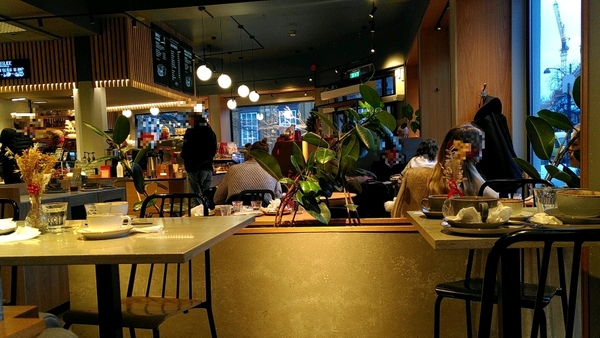
The company has expanded vastly in the past few years, with shop openings in Oslo (which by now also hosts the headquarter), Stavanger, Bergen and a few other places and last but not least at its birthplace: If you cannot find a spare seat in the cafe where it all began simply walk a few more steps to Dronningensgate. With its upmarket shop front it's the perfect place for a coffee date. The place has chairs filling every possible space, so especially during the winter it is advisable to find a table, place your jackets there and go to buy your food and drink with hands free and a bit slimmer.

A short stroll over the bridge there's a third branch by the waterfront, inside the
Solsiden shopping mall with even longer opening hours. They have a spacious sitting area outdoor, although its use is limited due to the ever changing weather in Trondheim. Good to know: All Godt Brød branches accept anonymous payments without data traces, using cash.
Heartier food like organic egg and bacon for breakfast or lamb burgers for lunch or dinner, together with organic softdrinks can be had at Ramp Pub and Spiseri at Svartlamon. Vegetarian options are available. Service at this shabby-homely place may be a little slow, and not all of the ingredients are organic.
Formerly entirely furnished with formica tables and chairs the interior has improved since, but gentrification hasn't replaced the proletarian chic yet.
The kitchen closes at 9 pm.
Real organic food, vegan and vegetarian, is served at neighbourhood Cafe Stammen in Kongens gate. Unfortunately their opening hours are rather limited, so I haven't been able to pay a visit yet. Let me know about your experience if you happen to eat there before me.
Simple seasonal lunch with the little extra, home-made predominantly from produce of small-scale organic (though not necessarily certified) farms from the Trøndelag region, sourdough bread of traditional grains from the adjacent bakery, coffee and books, this is
Sellanraa next to the city library and Kunsthall museum. Unfortunately they do not serve dinner and are closed on Sundays.
At the airport
Airports generally aren't the place for a conscious lifestyle, but if you cannot avoid to fly from Trondheim Airport Værnes you may at least have an organic coffee past security at
Haven next to
gate 35.

Permanently closed or no longer organic
The following places are either closed, with references remaining on the web, or ceased to offer organic items:
- Credo, Ørjaveita 4 (partially organic gourmet restaurant, re-opened on new location)
- Credo, Ladeveien 9
- Jossa, Ladeveien 9 (part of the Credo restaurant family)
- Edoramen, Ladeveien 9c (part of the Credo restaurant family)
- Kafé Soil, Nedre Bakklandet 20d
- Makro Buffet og Restaurant, Prinsens gt. 4c (partially organic macrobiotic eatery)
- Trondheim Mathall, Prinsens gt. 30 (partially organic restaurant and delicatessen)
- Persilleriet, Erling Skakkes gt. 39 (one of the pioneers of organic vegetarian food in Trondheim, replaced by a vegan lunch bar, Erlings, where you perhaps also will find some organic items if you ask)
- Persilleriet St. Olavs Hospital, Olav Kyrres gt. 13
- Selma,
TMV kaia 13 (pizza)
- Dromedar Kaffebar (various places, do no longer have anything organic)
2025-01-03 15:00:00
[Trondheim, Oslo, Bergen, Stavanger, organic, fair, vegetarian, vegan, bakeries, cafe, takeaway, coffee, ice-cream, snacks, lunch, airports]
[direct link · table of contents]

Thursday, 22 August 2024
Forget about sushi, pizza, pasta, burgers, curries and other globalized commonplaces – in Dresden it's much easier to find hearty home-cooked dishes made from locally sourced ingredients rooted in local and regional food traditions. This does not necessarily mean German – mind you that the borders with Czechia and Poland are close, so many menus reflect influences rather from Eastern than Western or Southern European cuisines.
Many dishes include meat, yes, but all the places I am covering here have a decent selection of tasty vegetarian options readily available.
Old town
A few steps from the Altmarkt, just across Kreuzkirche you'll find Cafe Aha which is covered here. Longer west, facing the modern building of the University of Music in Schützengasse you may be surprised to find a small island of baroque buildings with a wild garden, housing the city's environmental centre, and a great disappointment: The cosy rustic wholefood restaurant on ground flour dubbed Brennnessel ("stinging nettle") once used organic ingredients and still can be found listed as an organic restaurant, but alas! – no more.
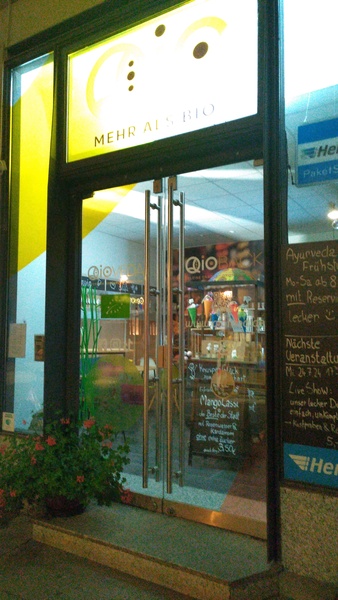
For a filling ayurvedic lunch or snack a few steps from the tram hub Pirnaischer Platz pay a visit to the
Qio bistro, in the vicinity of Cafe Aha. The place is a add-on to a small organic snack bakery – needless to say that you can buy their vegan sweet and savoury crackers made from legumes instead of wheat here alongside with a range of teas and other organic food items. On prior notice they also serve ayurvedic breakfast. So far I haven't had the opportunity to eat (or have a coffee) here, so let me know what you think.

Neustadt
For rustic food and surroundings head for one of the oldest independent pubs in town, the Planwirtschaft ("planned economy") in the Neustadt neighbourhood, popular since its beginnings as an illegal pub in the late GDR. On mezzanine level they serve breakfast, lunch and dinner as well as coffee and cake while the basement houses a pub which opens in the evening. When it comes to their supplies they focus on buying from local farms and enterprises as the (unfortunately not organic) independent butcher's directly across the street or a tea shop next door from which they also source the organic teas on offer. The goat cheese is always organic. They used to have an organic meat dish (which was marked as "bio" on the menu), but unfortunately no longer. My vegan dish of the day (celeriac in a hearty plum-fragranced sause with polenta and green salad) was absolutely tasteful. Have a tasty organic apple cider or beer, and ask about organic ingredients.

Young German kitchen is the promise of the Lila Soße ("purple sauce") gastro bar within the eccentric
Kunsthofpassage with its small boutiques and lovely places. Apart from daily changing main courses (most of them meat or fish, and often with an Italian touch) you can order tasty German "tapas" to your liking – warm, cold and sweet – served in a glass as well as dips and bread. None of the courses are fully organic, but many ingredients are, and chances are high that you can combine cleverly if you ask. They offer organic softdrinks, but no organic alcoholic beverages.
Out of town
If you take the urban train number 2 from the Neustadt train station, either on the way to the airport or to a stroll in the woods of Dresdner Heide, get off Bahnhof Klotzsche (one stop before the airport) and have breakfast, lunch, tea or a snack in its 110 years old railway station. Since the folks of Vorwerk Podemus took over and restored the historical building in 2015 it has been home to a bicycle shop, an artist's studio, an organic supermarket, and the now fully organic station restaurant dubbed Bio-Bahnhofswirtschaft with its pleasant beergarden.
Travellers and ramblers may be glad to hear that they can fetch an organic breakfast or packed lunch on the go, though
unfortunately not on Sundays as the restaurant is closed that day.

The vineyards on the slopes of the river Elbe around Dresden form Europe's smallest, most northern wine region, and fortunately the Saxon state winery of Hoflößnitz in Radebeul turned organic. The small town located west of Dresden on the northern shore of the river is famous for the writer of travel fiction, Karl May and its Museum of North American Indian Culture and can be reached easily, both by urban train, tram no. 4 and bicycle. Follow the Elberadweg cycle route on the southern shore, cross the bridge at Niederwartha and turn back east on the northern shore cycle route through Radebeul until you find signposts pointing to the vineyards on the hill.
The Hoflößnitz winery has a small self-service restaurant, the Hoflößnitzer Weinterasse, with an outdoor seating area shaded by horsechestnut trees from where you have a great view over the grapewines and the valley while tasting the local wines. All wines, but not all the food are organic: Your best choice is the "Winzerplatte" – home-made white bread with pickles, a little salad and a number of spreads of your choice of which the bread and the vegan spreads are organic.
There's also a small museum with information on all Saxon wineries and a wine shop where you can buy their products, mainly white and sparkling wines. Stick to Hoflößnitz for organic ones.
No longer organic
In 2012, when the
Mensa U-Boot ("submarine") on the campus of the Technical University on the campus of the Technical University was opened after major refurbishment work
it was re-opened as a fully organic students' refectory offering
one vegetarian and one omnivore meal at a very competitive price. All food and drinks at that time were certified organic. Unfortunately this is no longer the case in 2022: Given low frequent visits during the Corona pandemic the staff decided to not prolong their organic certification and turn to cheaper ingredients.
Closed
The following places ceased to exist, although you still may find references to them on the web:
-
Lilisou, Louisenstr. 58 (vegetarian, burgers, soups, curries)
- Lingner, Lingnerpl. 1 (German, international)
-
ElectricLotus, Louisenstr. 58 (vegetarian, ayurvedic, Indian)
- Abutheke, Alaunstr. 68a (Middle-Eastern)
- roots, Hauptstr. 35 (vegan fast food)
- Wurzelküche, Alaunstr. 11 (vegan)
2024-08-22 17:00:00
[Dresden, Radebeul, Elbe_cycle_route, Elberadweg, Neustadt, vegan, organic, coffee, lunch, dinner, snacks, restaurant, pub, wine, beergarden]
[direct link · table of contents]

Wednesday, 21 August 2024
If you are familiar with Johann Sebastian Bach's Coffee Cantata from around 1735 you've heard about the Saxonian citoyens' love for coffee and a good piece of cake (if heading for a local speciality, try the Eierschecke cheese-cake). With a pinch of irony people will talk about the famous Saxonian "Bliemschenkaffee" ("(little) flower coffee") referring to the thin coffee or caffeine-free coffee substitute during World War II or in the households of the poor. The term refers to the fact that you could see the flowery ornaments on the ground of the (well, not in all cases) Dresden china coffee cup.
The Saxonian's love for coffee hasn't faded since, they still proudly refer to themselves as "Kaffeesachsen" (coffee Saxonians), and most organic supermarkets will serve you a latte or Italian style coffee, both to have on the spot, and to go (in this case don't forget your refillable cup).
There are however more pleasant places for a chat with friends, some reading or working time with a delicious cup of coffee.
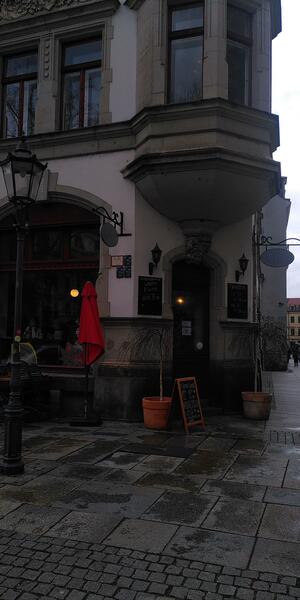
Neustadt
My favourite day cafe for about seven years, with friendly service and a huge display of gorgeous cakes and pastries, Die Kuchenglocke in Wilheminian Neustadt unfortunately closed in summer 2022. Run by the son of
Dresden's first (and to my knowledge only) organic bakers and one of the first organic ice-cream makers in Germany it revived the
tradition of Viennese style coffeehouses in the city. In 2022 he took over the
Heller bakery, and the cafe had to close. In March, 2023 it re-opened as Café Glocke, and apart from the interior decoration, not much has changed: You can still/again have (and buy to take out) cakes and coffee, and have gorgeous fully organic breakfast(all day long) and lunch. When the weather is nice take the chance to sit outside at the beautiful, comparatively quiet square around Martin Luther church.
The price for a (vegetarian) breakfast, sweet with pancakes or a croissant, savoury e.g. with hummus, roasted veges, bulgur and other spreads, is around 20 EUR but since the servings (especially of the savoury types) are quite generous, you may decide to share as long as you're not on your own.
On weekends it is advisable to order a table in advance as the place usually is quite crowded at that time.
The bad news: Effective February 2024 the place stopped accepting cash. Since the Oswaldz cafes have never been accepting payments without data tracking, the number of non-discriminatory organic breakfast and lunch places with a sense for data privacy are alarmingly diminishing in town.
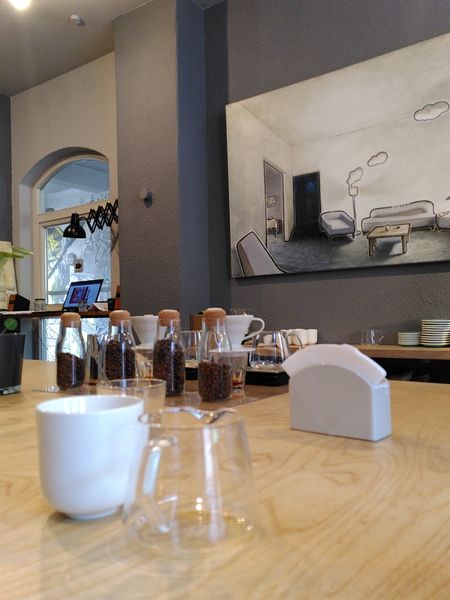
Not far away, on Bautzner Straße, you will find Phoenix Kaffeerösterei, a small-scale coffee roaster cum coffee bar furnished in coffee-coloured wood – ideal for the recreational sip of Italian style coffee. Their coffee is fairly traded, yet not organically certified, although they had organic coffee when they started up in 2006. The milk for a latte or New Zealand style Flat White however is organic. Mind you that their opening hours are quite restricted, usually to Fridays and Saturdays, but they often keep closed on Saturdays, too.
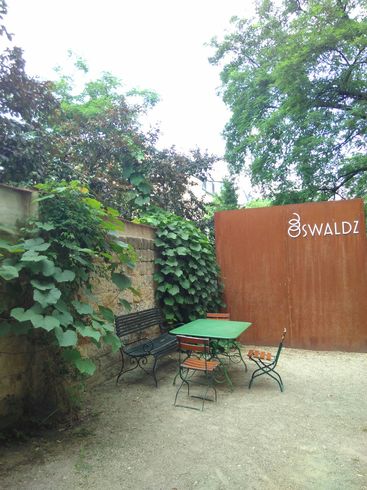
A ten minutes walk west, just before you reach Albert-Platz you can taste the Phoenix coffee all week long at the Oswaldz, a crowded coffee house cum gallery run by an ambitious young team. Before you sit down fetch a service number and put your order at the bar where you can choose from an impressive list of coffee drinks, among others a galao (coffee and milk frozzed together) or a gibraltar (double espresso macchiato). The milk they use is locally sourced and organic. You can also have a sandwich or cake partially made from organic ingredients – eggs and cottage cheese are organic, flour and fruit are not, and since the friendly staff happily answered my questions I'm sure they will equally friendly answer yours. During the warm season they open a pleasant backyard for their guests.
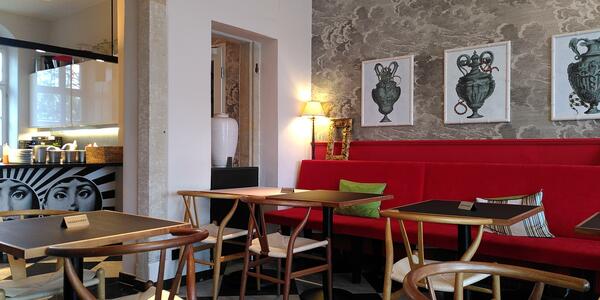
In 2023 Oswaldz rented a second shop next door and turned it into
serviced Oswaldz Breakfast Place.
All food for both, the cafe and the breakfast restaurant are prepared in its open kitchen while the coffee drinks are made by the baristas at the cafe. The menu is the same for both places as is the privacy-unfriendly decision to refuse payments in cash.
During the warm season there's a third Oswaldz place, the
Os2 – Café am Fluss.
Unfortunately there's no organic coffee place inside the Bahnhof Neustadt railway station, but if you have sufficient time you may leave the station building at the rear (Northern) entrance and head for the friendly self-service cafe cum bistro of the VG supermarket Friedensstraße for both, breakfast, lunch (try the hearty Soljanka soup if available), a snack, coffee or travel provisions.
Old town
Facing Kreuzkirche on Altmarkt with its white-washed interior one of the few places where the wounds of the Anglo-American bombing by the end of World War II still are visible you will find one of Dresden's first organically certified eating places, cafe cum restaurant Aha. Some years ago they quite controversely decided not to prolong their certification in support of uncertified local farmers following organic or near-organic principles. More than 75 percent of the ingredients they use are still organically certified but they stopped (probably enforced by law) to make this transparent, so you have to enquire on specific ingredients if you care.
The cafe itself is equally popular among students, families and NGO groups. Its walls frequently serve as a gallery for local artists, and the daily menu often reflects and extends the exhibitions. The list of coffee drinks is long, ranging from oriental and Indian inspired spiced coffee to the ubiquitous espresso.
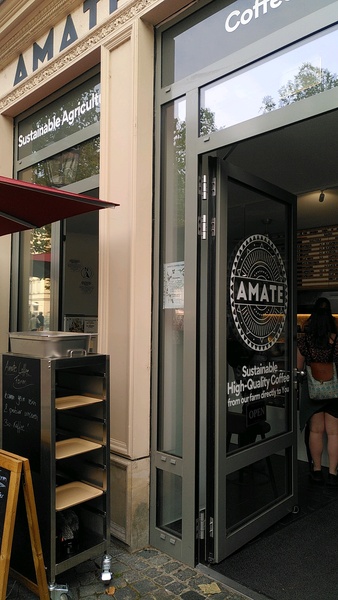
The cakes are delivered by the Heller family, but you can also enjoy hearty home-made meals throughout the day (til late), or simply help yourself at the salad bar located under the stairs. Breakfast is being served from 9 am. In the basement there's a well assorted
fair-trade shop
which cannot follow the restaurant's liberal opening hours and is closed in the evenings and on Sundays.
In the maze of tourist restaurants around the Neumarkt place with iconic Frauenkirche you'll find
Amate Coffee Farm, an inviting coffee place with pleasant outdoor seating serving organic coffee drinks made from directly and fairly traded Mexican coffee. The menu also offers organic softdrinks, but as my time here was very brief I couldn't ask the staff whether the cake was organic, too.
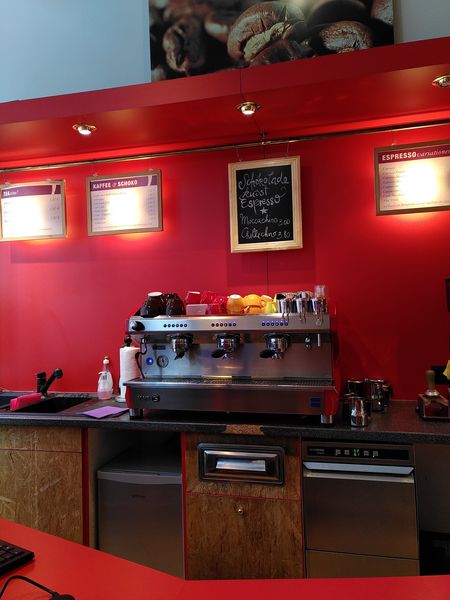
If you have to spent time in the vicinity of Dresden's central train station, Hauptbahnhof, pay a visit to another fair-trade shop, the Contigo at the Southern end of Prager Straße. Inside the shop there's an organic coffee bar, perfectly suited for the quick espresso in between, or while you're shopping for gifts, fairly traded artisanal work like bags and jewellery, tea, chocolates or coffee. They do not serve food, so you shouldn't come hungry. If you prefer an unconventional coffee drink opt a coffee based lemonade dubbed "Selosoda".
When the Contigo store is closed ignore the Starbucks branch at Wiener Platz and turn
instead to the
Haferkater porridge cafe facing it. The Berlin-based franchise concept can be found in several German main train stations by now, and the one in Dresden is open on weekends and generally until 8pm. While all prepackaged Haferkater products are organic no promise is made when it comes to the fresh food and drinks, so you'd better ask. Also, ask for returnable cups and bowls if you don't bring your own.
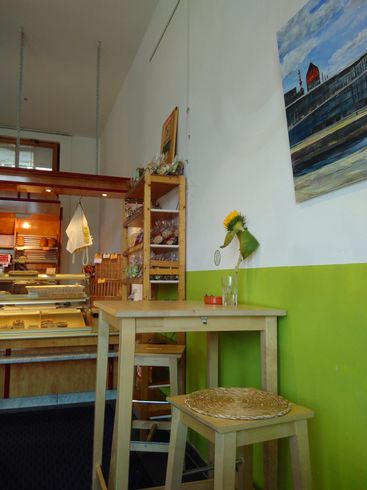
Dresden-Mitte
Not far from Bahnhof Mitte train station and the College of Music the organic co-operative VG runs a self-service Bistro & Backladen – the bistro to the left, the cafe to the right of the entrance. While the lunch is prepared in the open kitchen of the bistro right at the spot, the bakery shop simply sells the cakes (and bread) from local organic bakeries both, to take away and to eat right here in the pleasantly decorated shop room prided with pictures of local artists. Unfortunately the coffee comes from a smale-scale automatic machine – no real enjoyment, but drinkable due to the good ingredients.
While the bistro closes at 7pm on weekdays the cafe operates until 8 pm, but choice will be limited the later you'll come.
Near the Blaues Wunder bridge
A visit to the finest bridge in town, the Blaues Wunder ("blue wonder") steel construction can easily be combined with a visit to the arguably finest Viennese-style coffee house in town, the Café Toscana. Observing the bridge and the river you can sit in the winter garden having an organic coffee drink or tea. Your organic latte will be poured together at your table. While a selection of soft drinks and wines, the milk and breakfast eggs are all organic none of the gorgeously looking cakes and confectionery to be ordered from the sales desk are, at least not fully (enquire about what's tempting you). The history of the coffee house named after a Saxon princess customer dates back to the end of the 19th century. Since its re-privatisation after Germany's re-unification it has been run by the Eisold family, a local baker's family now in its third generation.
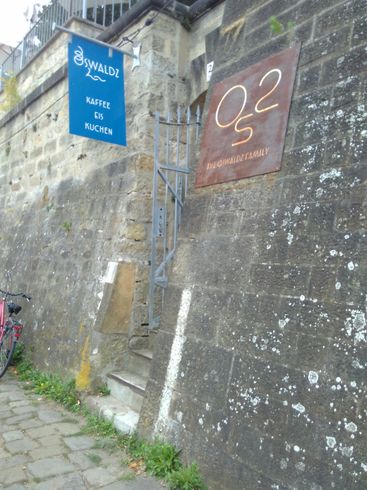 Crossing the blue wonder bridge you'll reach Körnerplatz, and if you fancy a stroll along the river shore, turn left into historical Körnerweg which leads you towards the city centre along the embankment. A 15 minutes walk on the way you'll find Os2 – Café am Fluss, a summer cafe run by the Oswaldz owners serving coffee drinks with organic milk, organic soft drinks and cakes to passers-by on weekends during the nice season. Most seats are located outside providing a beautiful view over the river and the city's silhouette. As at Oswaldz order at the bar inside, find yourself a seat, wait to be served and pay before you leave. The bar room also serves as an art gallery.
Crossing the blue wonder bridge you'll reach Körnerplatz, and if you fancy a stroll along the river shore, turn left into historical Körnerweg which leads you towards the city centre along the embankment. A 15 minutes walk on the way you'll find Os2 – Café am Fluss, a summer cafe run by the Oswaldz owners serving coffee drinks with organic milk, organic soft drinks and cakes to passers-by on weekends during the nice season. Most seats are located outside providing a beautiful view over the river and the city's silhouette. As at Oswaldz order at the bar inside, find yourself a seat, wait to be served and pay before you leave. The bar room also serves as an art gallery.
Leubnitz
If you ever happen to strand somewhere between the tower blocks of Prohlis and the Technical University, take the time to visit the city's only organic bakery and confectionery, the Bio-Bäckerei und -Konditorei Heller mentioned afore – if only to have a wonderful ice-cream on the go. When the weather is nice they also have a small outdoor terrace for you to have a coffee and cake or snack.
Although the bakery is open on Sunday mornings it's closed on public holidays.
Closed or no longer offering organic options
The following places ceased to exist, although you still may find references to them on the web:
2024-08-21 20:00:00
[Dresden, Neustadt, organic, coffee, breakfast, lunch, snacks, fair, cafe, ice-cream, restaurant, confectioners]
[direct link · table of contents]


































 Crossing the blue wonder bridge you'll reach Körnerplatz, and if you fancy a stroll along the river shore, turn left into historical Körnerweg which leads you towards the city centre along the embankment. A 15 minutes walk on the way you'll find
Crossing the blue wonder bridge you'll reach Körnerplatz, and if you fancy a stroll along the river shore, turn left into historical Körnerweg which leads you towards the city centre along the embankment. A 15 minutes walk on the way you'll find